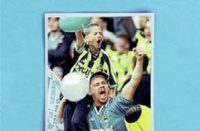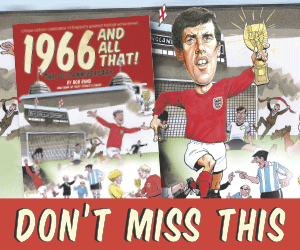MATT BADCOCK and JOHN LYONS review the pick of the latest football books to hit the shelves
JOURNEYMAN – ONE MAN’S ODYSSEY THROUGH THE LOWER LEAGUES OF ENGLISH FOOTBALL, BY BEN SMITH, PUBLISHED BY BITEBACK PUBLISHING, £12.99
RATING OUT OF 10:9
FOOTBALLERS, eh? What a life they lead. Fast cars, massive pay checks and home by 1pm after kicking a ball about in the morning.
That last perk is probably the only thing Ben Smith had in common with those players raking in the cash at the top of the game.
The Premier League really is a million miles away. Having started out at Arsenal, training alongside Dennis Bergkamp and Ian Wright, Smith’s career took a slightly different path. He has a 12-year-old Ford Focus to prove it.
But it’s the insight into a reality familiar to the majority of professional footballers that makes Smith’s book so enjoyable.
A journey that took Smith to Reading, Yeovil, Hereford, Shrewsbury and into Non-League with Weymouth and Crawley.
Smith is open enough to admit he didn’t exactly play for the clubs of his dreams. But he had success, winning promotion from League One, the Conference and Conference South, as well as playing at Old Trafford in the FA Cup.
It’s a laugh-out-loud read as he takes us inside the dressing room to recount stories of the characters he played alongside.
There are some anecdotes that make the eyes water for other reasons. Safe to say, you may never eat a yoghurt covered raisin ever again.
Of course, Smith also had the pleasure of playing under one of football’s most colourful characters, Steve Evans.
The Crawley days provide ample material, with Evans’ hilarious rants – you’d be annoyed if someone ate your fish and chips on the way home, too – and bizarre motivation techniques.
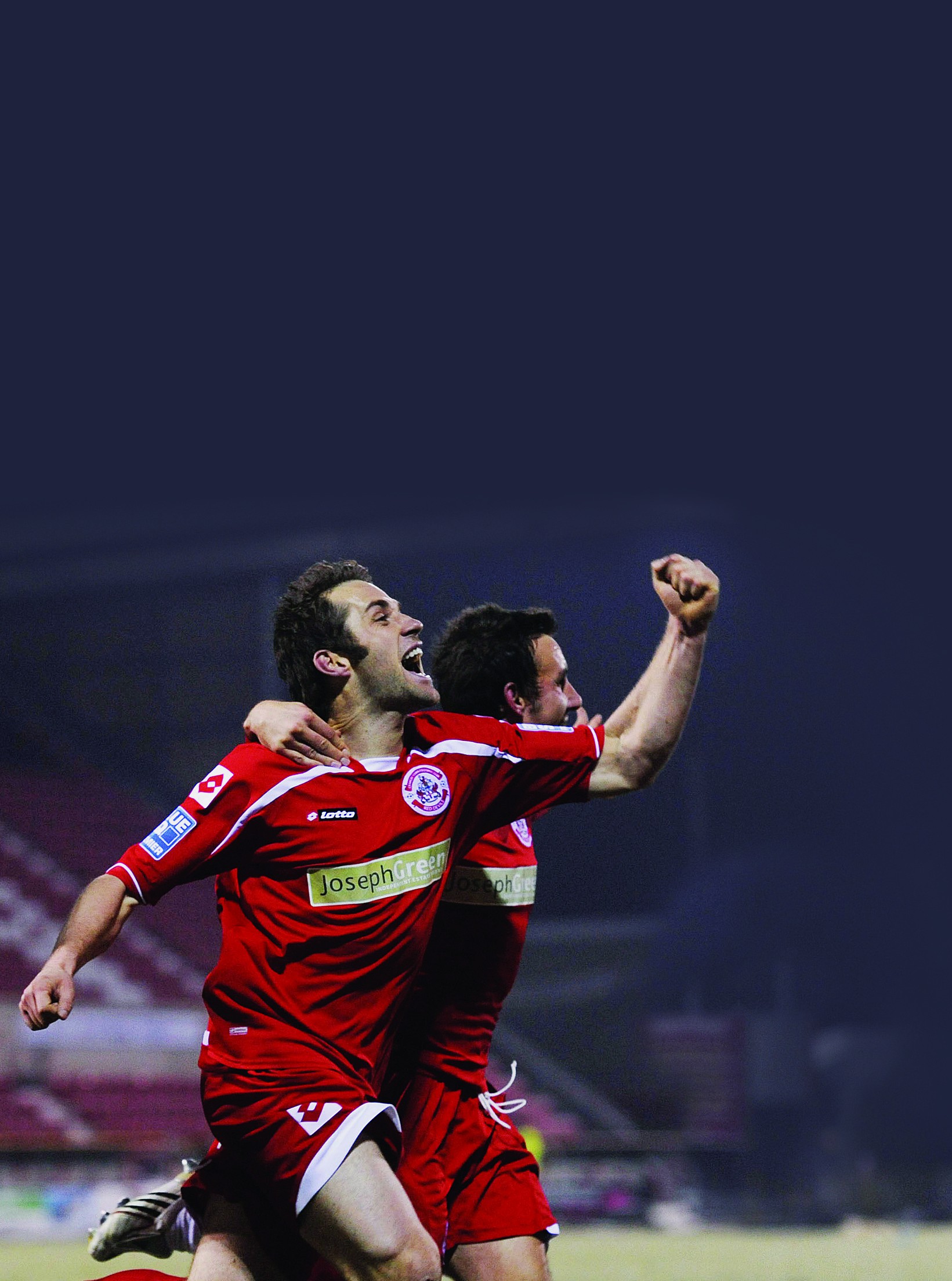
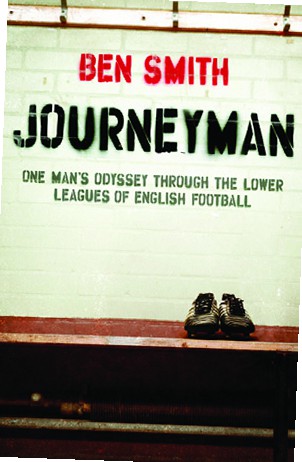
It’s not all Evans-bashing though. Smith credits the current Rotherham manager for getting the best out of him and his team in their successful completion of Project Promotion.
Smith even got a £12-a-week pay rise when Crawley went up! This side of the book is fascinating. Smith talks numbers and gives eyeopening accounts of how his contract negotiations worked, figures and all. Interspersed throughout the book, Smith provides a running commentary on the present day. While writing the book, he was playing semi-pro football and trying to carve out a career as a teacher.
This book stands out from the crowd and from the usual run-of-themill autobiographies. Overall, a cracking read.
PITCH BLACK – THE STORY OF BLACK BRITISH FOOTBALLERS, BY EMY ONUORA, PUBLISHED BY BITEBACK PUBLISHING, £16.99.
RATING OUT OF 10:8
You may well have already heard of Emy Onuora’s book Pitch Black.
For ex-Birmingham City striker Richie Moran’s claims that former England boss Graham Taylor told him that he was put under pressure to limit the number of black players in the national team gained widespread publicity.
Taylor said he had no memory of the con- versation and the hoo-ha eventually died down.
However, it would be a shame if one contentious story in a book of more than 300 pages was allowed to dominate proceedings.
For this is an extremely comprehensive study of how black British footballers have grown from an abused minority to a significant number over the last 40 years or so.
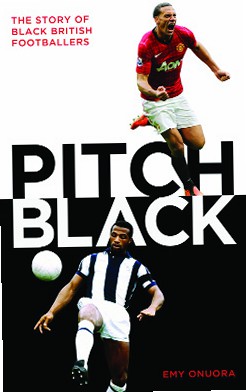
It’s easy to forget just how tough the early black players had it. No one deserves to have bananas thrown at them or suffer monkey chanting as they try to go about their job, just because of the colour of their skin.
Back in the 70s, the players just had to take it, shrug it off and try to ignore it. There wasn’t the emphasis on racist behaviour that there is now.
Interviews with the likes of Bradford City legend Ces Podd, Manchester City goalkeeper Alex Williams, West Brom’s Cyrille Regis and Nottingham Forest’s Viv Anderson give the book an authentic flavour of what it was like to be a black player in those days.
As Brendon Batson, one of the so-called Three Degrees at West Brom alongside Regis and Laurie Cunningham, said: “We’d get off the coach at away matches and the National Front would be right there in your face. In those days, we didn’t have security and we’d have to run the gauntlet.
“We’d get to the players’ entrance and there’d be spit on my jacket or Cyrille’s shirt. It was a sign of the times. I don’t recall making a big hue and cry about it. We coped. It wasn’t a new phenomenon to us.”
Onuora, the brother of former footballer Iffy, points out how the authorities and media ignored racism in those times. And while the number of black players has increased massively over the last few decades, the problems haven’t all been magically wiped away. Where are, for example, the black managers and administrators?
As former West Ham star and current PFA deputy chief executive Bobby Barnes said: “You could have a meeting of black administrators in a phone box.”
And what’s the point of doing all your coaching qualifications if you then can’t get a job?
This book covers both past and present, and provides plenty of food for thought. It also makes you think about the future.
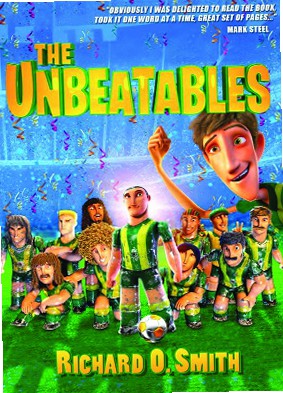
THE UNBEATABLES, BY RICHARD O.SMITH, PUBLISHED BY SIGNAL BOOKS. PRICE: £7.99.
RATING OUT OF 10:7
If you’re looking for a light-hearted, fun read, then The Unbeatables could be just the ticket.
You may have seen the animated film of the same name, but it won’t spoil your enjoyment of the book if you haven’t.
Penned by Richard O. Smith, the principal screenwriter of the film, the novel has been targeted for young (and not so young) adults.
It tells the tale of Amadeo, who reigns supreme at table football in the local café with his loyal team of tiny foosballers – including beating town bully Flash.
But then Flash returns years later as a football superstar and challenges Amadeo to a real football match with the future of the village at stake.
Early doors, the book gets off to quite a slow start, but by the end the pace has really quickened. The lively, well-written lines will have you chuckling away.
For example, when the miniature foosballers are dumped on a real rubbish dump.
“There are rumours most of them have ended up on the rubbish heap.” “What? Joined West Ham?”
“No, literally on the rubbish heap.” “Millwall?” “No, on an actual, real-life rubbish dump.”
Or what about when big-head Flash talks about all his amazing plans to transform the village.
“Next to the stadium will be a football research area built to improve the science behind football. Plus a museum dedicated to the all-time footballing greats: me, Pele, Cruyff, Messi, Ronaldo and Emile Heskey.”
And when the love of Amadeo’s life, Lara, gives the Village players a half-time rollicking in their crunch match against Flash and his Grandmasters.
“The four corner flags were more mobile in the first half than this back four. The midfield were like honest politicians ie: utterly nonexistent, and the keeper couldn’t catch a bus. And as for the strikers’ finishing abilities, not only couldn’t you hit a cow’s arse with a banjo, you’re incapable of hitting an elephant’s backside with a double bass.”
There’s also the pungent smell of the Village team’s Pongo Stinky Stinkman.
“He hasn’t had a wash in years – he’s arguably the dirtiest player since Vinnie Jones played on a muddy pitch and the showers were broken.”
As the big match approaches its climax, referee Signor Bunga takes a more prominent role.
“The referee needs to read the following letters from an optician’s chart: Y.O.U.B.L.I.N.D.G.I.T”
The foosballers – Skip, Rico, Loco and co -get out on the pitch and try to do their bit to turn the game around, but there are a few late twists and turns to keep you turning the pages. An entertaining read.
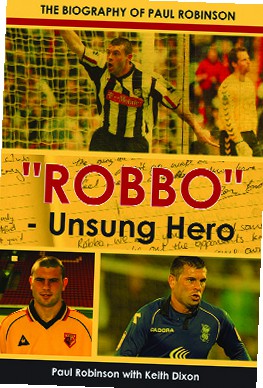
ROBBO – UNSUNG HERO, THE BIOGRA-PHY OF PAUL ROBINSON, BY PAUL ROBINSON WITH KEITH DIXON, PUBLISHED BY DB PUBLISHING, £ 14.99.
RATING OUT OF 10:6
Left-back Paul Robinson is the kind of player you want in your team rather than playing for the opposition. In an almost 20-year career, he’s shown himself to be a tough nut, a 100 per cent player, a hard tackler.
The 36-year-old is not the kind of player you would expect to read a biography about. In fact, writer and Birmingham City fanatic Keith Dixon was initially going to get Robinson to write the foreword for a book he was planning about the Blues’ successful captains.
However, after meeting with the skipper, he decided to pen a book about him. It is, in some ways, a strange book. One of the reasons for that is it is part-biography and part-autobiography. Sometimes the lines become blurred.
There are also odd things in it – like miniprofiles of other players and clubs, and a picture of a play-off final hospitality menu cover.
But it is a detailed account of his time playing for Watford, West Brom, Bolton and Birmingham. It talks us through his days as a youngster coming through at home-town club Watford to his days as a veteran captain at the Blues.
There are also 16 memorable games chosen by Robinson in his career. They were meant to be either significant for the clubs concerned or for himself.
And you can’t accuse the former England U21 international of ducking issues. The games selected start with a match in which he broke Stewart Talbot’s leg playing for Watford and end with an 8-0 defeat for Birmingham against Bournemouth.
In between, there are FA Cup semi-final defeats for Watford against Southampton, West Brom against Portsmouth and Bolton against Stoke, plus West Brom’s great escape from Premier League relegation in 2005.
However, it would have been better if they had been accounts of those games from Robinson himself rather than match reports.
What does come across very well in this book is Robinson’s love of the game and determination, probably why he has had such a lengthy career in the top two divisions.
As he himself said: “Technically, I may not be the most skilful, but what I do have is the heart and drive to want to be the best at what I do and I want to prove people wrong that said to me that I wasn’t good enough.”
All in all, this book isn’t going to win any awards, but if you like Paul Robinson or the clubs he’s played for, then this will have something for you.
It’s a decent, solid book, much like Robinson in many ways – and at times there’s nothing wrong with that.



